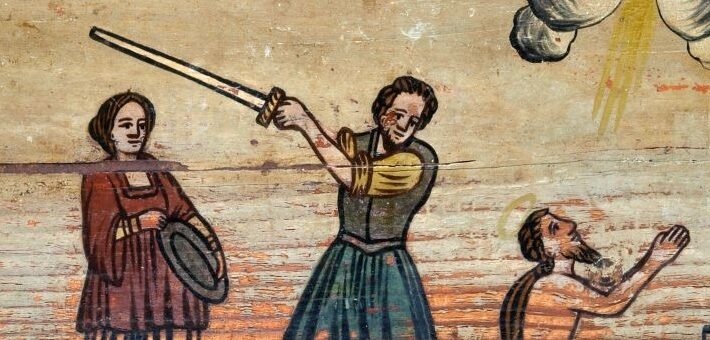Commentary on Mark 6:1-29
Today’s text shows us what the world does to its prophets. Jesus is rejected, John is beheaded, and nobody seems willing to take responsibility. Instead of receiving Jesus’ message, the crowd asks, “Where do carpenters learn to preach like this?” Herod fails to protect John, who he knows to be a righteous and holy man.
Mark 6:1–13: Jesus the prophet of Nazareth in Galilee
Jesus returns to his hometown,1 and people are astounded at his teaching. The same term “astounded” was used to describe the synagogue attendees in Capernaum (Mark 1:22), but Jesus’ reception in Capernaum was largely positive. Jesus’ reception in his hometown takes a turn.
Those gathered at the synagogue take offense at Jesus. They do not take offense at his teachings; rather, they become offended as they are listing Jesus’ occupation and his family of origin. “Is this not the carpenter, the son of Mary?” To the people in his hometown, Jesus is still a carpenter with no mention of a father. He isn’t the sort of person they would expect to be a prophet. For some, going back home serves as a reminder for why they left in the first place.
After a chilly reception in his hometown, Jesus sends out his disciples, giving them authority over the unclean spirits. Jesus, a fatherless carpenter, challenges the Roman narrative (and modern narratives) for how power works. Rhoads, Dewey, and Michie draw out this contrast:
Rome works from the center out; God’s reign begins at the margins, in the wilderness, initiating a new sociopolitical order. Rome works from the top down; God’s reign starts from the bottom up, a peasant movement spreading like invasive mustard plants. Rome secures the strongest of its people and exploits the weak; God’s reign restores the weakest and the most vulnerable.2
Rather than power demonstrated by all that one has, power in God’s reign is demonstrated by all that one gives. Jesus’ teaching remains astounding to this day; he draws us into the tension of living out his vision in the world that attempts to dictate might as right.
Mark 6:14–29: John the prophet, Herod the haunted king
Herod Antipas, son of Herod the Great, knew a thing or two about might and right. John the Baptist has been imprisoned from the beginning of Jesus’ ministry (Mark 1:14), and in Mark 6 we learn why. The relationship between John and Herod Antipas is perplexing. Both the Gospels and Josephus relate stories of Herod interacting with John, his marriage to Herodias, and his responsibility for John the Baptist’s death (Antiquities 18.5.1–2), albeit for different reasons.
Whereas Josephus presents Herod as paranoid that John might begin a rebellion on the basis of his popularity, Mark 6 presents Herod as abdicating his responsibility; he does not stop John’s imprisonment or beheading, even though he believes John is a righteous and holy man (Mark 6:20). This abdication makes sense of Herod’s paranoia when he hears about Jesus, whom he supposes to be John resurrected.
There is some disagreement among early manuscripts in Mark 6:14 as to whether Herod or others are reasoning that John has been raised from the dead. Given the repetition of the same belief in Mark 6:16, with the addition that Herod had beheaded him, one could make an argument that Herod would be the one wondering about Jesus as a resurrected John. The verbs here are in the imperfect tense, which gives the impression that Herod and those responding to him are repeating these possibilities about Jesus’ identity.
Preachers might represent this sort of expression in sermons by presenting the text as a repetition: “Herod kept repeating, ‘John has been raised from the dead … John has been raised from the dead.’ But others kept saying, ‘No, it’s Elijah … I’m telling you, it’s Elijah,’ while still others repeated, ‘Maybe he’s one of the prophets of old—could he be one of the prophets of old?’” We can almost see Herod pacing in his palace, nervous about what is to transpire.
The narrator takes center stage in describing John’s arrest and murder, perhaps representing Herod’s own flashback. Herod is cast as a passive figure, bent on avoiding shame rather than doing what is right. Herodias wanted John to be killed, but Herod arrested him instead. At Herod’s party, his stepdaughter dances for him and his cohort, despite the custom that respectable women do not provide such entertainment at these sorts of gatherings (notice that Herodias is separate from the party), and Herod promises to give her anything she wishes. At her request, Herod murders an innocent man, whom he now suspects has come back to haunt him.
How we treat prophets
With the season of Lent quickly approaching, preachers may want to consider viewing Mark 6 from the position of the crowds in Nazareth and Herod Antipas. Sometimes we, like the crowds at Nazareth, discount people who tell us difficult truths and look for reasons to discredit them. Sometimes we, like Herod, tolerate the suffering of innocent people because doing the right thing is inexpedient.
We have the luxury of knowing who Jesus is and that he is for us. Jesus has felt the weight of rejection in his hometown, and he haunts those who cause unjust suffering. Like one of the prophets of old, Jesus calls us to renewed faithfulness and empowers us with the courage to enact it. Jesus draws us into God’s reign so that when we pray “Thy kingdom come,” and “Thy will be done,” we are not praying vaguely about long ago and far away or some distant future. We pray that God’s reign would come among us now, disbanding the forces that separate us from God and from each other.
Notes
- Galilee was known by the first century as a seedbed of seditious activity. Josephus, a first-century Jewish historian, asserts that “the Galileans are inured to war from their infancy, and have been always very numerous; nor hath the country been ever destitute of men of courage, or wanted a numerous set of them” (B.J. 3.2). Judas the Galilean, who argued to take up arms in protest against Roman taxation policies, hailed from there.
- David Rhoads, Joanna Dewey, and Donald Michie, Mark as Story: An Introduction to the Narrative of a Gospel, 3rd ed. (Minneapolis, Fortress Press: 2012), 147.
PRAYER OF THE DAY
Holy Jesus, you sent many into the world to proclaim your kingdom on earth. Send us, equip us, and walk with us so that everyone can learn of your abundant love. Amen.
HYMNS
Eternal Father, strong to save ELW 756, GG 8, H82 579/608
Take my life, that I may be ELW 583/685, GG 697, H82 707, UMH 399, NCH 448
CHORAL
I was glad when they said unto me, C. H. H. Parry


February 4, 2024